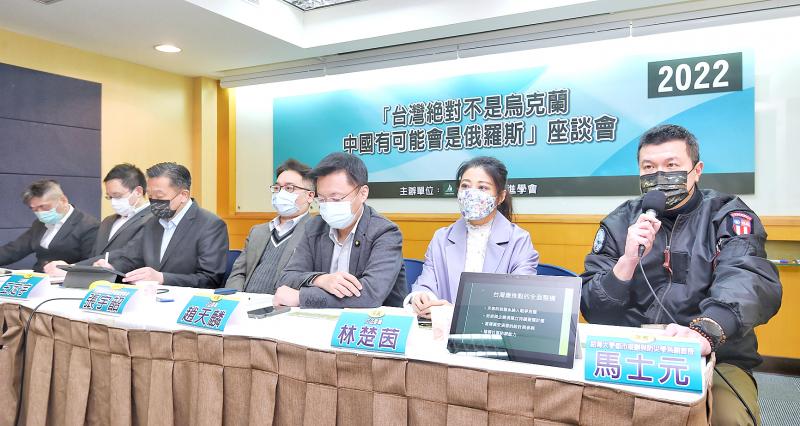Russia’s invasion of Ukraine should serve as a reminder to Taiwanese that dictatorships cannot be trusted, researchers and legislators said yesterday at a conference in Taipei held by the Strategy and Public Research Institute of Taiwan.
Speaking at the event, Institute for National Defense and Security Research research fellow Su Tzu-yun (蘇紫雲) said the invasion showed that agreements made with a dictatorship would be abandoned at the will of the dictator, citing the Molotov-Ribbentrop Pact and the Minsk agreements as examples.
The Molotov-Ribbentrop Pact was a non-aggression pact between Nazi Germany and the Soviet Union that was signed on Aug. 23, 1939, and broken on June 22, 1941, when Germany invaded the Soviet Union.

Photo: Fang Pin-chao, Taipei Times
The Minsk agreements, drafted in 2014, were aimed at ending war in Ukraine’s Donbas region, and were nullified on Tuesday last week when Russian President Vladimir Putin declared that the agreements “no longer existed.”
Russia had intended to fight a quick war, but has met strong resistance from Ukrainians, and is dealing with international sanctions and anti-war protests at home, Su said.
“If Russia is unable to take Ukraine in the next 48 hours, the situation will be unfavorable for Moscow,” he said.
Also speaking at the conference, Democratic Progressive Party Legislator Wang Ting-yu (王定宇) said that Chinese President Xi Jinping (習近平) appears to have expansionist ambitions similar to those of Putin, evidenced by China’s activities in the South China Sea, the East China Sea and the Taiwan Strait.
Dictators and their supporters try to justify their aggressions and blame their victims, DPP Legislator Chao Tien-lin (趙天麟) said at the conference.
“Putin claimed his invasion of Ukraine was to remove Nazi elements from the country,” he said. “You see the same in Taiwan, where pro-China elements have been blaming Ukraine for the invasion, saying it had provoked Russia.”
Such people are trying to change discourse in Taiwan by telling people not to provoke China, he said.
Maa Shyh-yuan (馬士元), an associate professor of urban planning and disaster management at Ming Chuan University, said at the conference that President Tsai Ing-wen’s (蔡英文) administration should express unity with Ukraine and think about ways of strengthening the nation’s resilience in the event of a disaster.
For example, war scenarios should be included in disaster response planning, and crucial businesses should be encouraged to establish plans to ensure sustainable operations in the event of a disaster, Maa said.
Taiwan could hold war response drills, and the fire department could be enlisted to help distribute disaster response supplies, such as is being done in Ukraine, he said.

US President Donald Trump said "it’s up to" Chinese President Xi Jinping (習近平) what China does on Taiwan, but that he would be "very unhappy" with a change in the "status quo," the New York Times said in an interview published yesterday. Xi "considers it to be a part of China, and that’s up to him what he’s going to be doing," Trump told the newspaper on Wednesday. "But I’ve expressed to him that I would be very unhappy if he did that, and I don’t think he’ll do that," he added. "I hope he doesn’t do that." Trump made the comments in

NOT AN OPENING: Trump’s violation of international law does not affect China’s consideration in attacking Taiwan; Beijing lacks capability, not precedent, an official said Taiwanese officials see the US’ capture of the president of Venezuela as a powerful deterrent to Beijing’s aggression and a timely reminder of the US’ ability to defeat militaries equipped with Chinese-made weapons. The strikes that toppled Venezuelan President Nicolas Maduro signaled to authoritarian leaders, including Chinese President Xi Jinping (習近平), US President Donald Trump’s willingness to use military might for international affairs core to US interests, one senior official in Taipei’s security circle said. That reassured Taiwan, the person said. Taipei has also dismissed the idea that Trump’s apparent violation of international law could embolden Beijing, said the official, who was not

A cold surge advisory was today issued for 18 cities and counties across Taiwan, with temperatures of below 10°C forecast during the day and into tonight, the Central Weather Administration (CWA) said. New Taipei City, Taipei, Taoyuan and Hsinchu, Miaoli and Yilan counties are expected to experience sustained temperatures of 10°C or lower, the CWA said. Temperatures are likely to temporarily drop below 10°C in most other areas, except Taitung, Pingtung, Penghu and Lienchiang (Matsu) counties, CWA data showed. The cold weather is being caused by a strong continental cold air mass, combined with radiative cooling, a process in which heat escapes from

Snow this morning fell on Alishan for the first time in seven years, as a strong continental cold air mass sent temperatures plunging across Taiwan, the Central Weather Administration (CWA) said. The Alishan weather station, located at an elevation of about 2,200m in central Taiwan, recorded snowfall from 8:55am to 9:15am, when the temperature dropped to about 1°C, the CWA said. With increased moisture and low temperatures in the high-altitude Alishan area, the conditions were favorable for snow, CWA forecaster Tsai Yi-chi (蔡伊其) said. The last time snow fell at the Alishan weather station was on Jan. 10, 2018, while graupel fell there